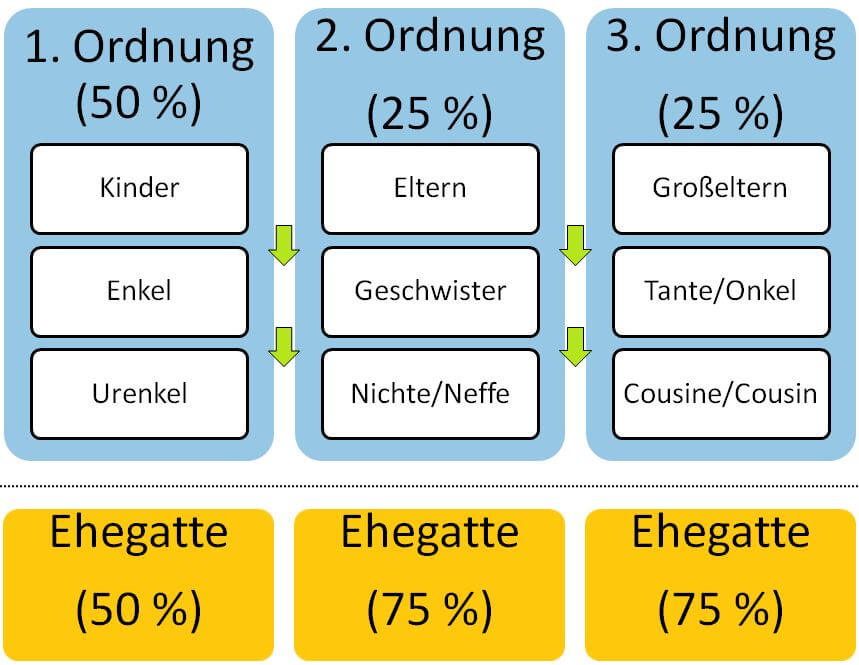A look at marriage from a financial perspective
What you can learn here
- A look at marriage from a financial perspective
- Income tax payable by unmarried couples
- How do common children affect unmarried couples?
- What about maintenance payments for unmarried & married couples
- Health Insurance and Hospitalization: Differences in Married vs. Unmarried Couples
- Living together unmarried: do we need a will?
- Married partners: Maximum tax allowance and survivor protection
- Conclusion: Are married people preferred in Germany?
- Opening free checking accounts
The number of marriages in Germany has been increasing again since 2003: What are the tax and legal consequences? Are married people preferred in Germany?

NGDPhotoworks
The number of marriages in Germany declined until around 2003. Since then there has been a real boom in marriages. extra evaluated the number of marriages in the graphic below.

Statistically, every third marriage in Germany ends in divorce. The high, albeit falling (see chart below) scares couples to tie the knot. After all, divorce is expensive and painful. But anyone who decides against marriage - for whatever reason - should be aware of the substitute mechanisms. Because they definitely exist.

Income tax payable by unmarried couples
If both partners earn a similar amount, your tax burden is roughly the same as that of married couples. The advantage of marriage increases with the spread of the two salaries. Accordingly, the advantage is maximum when the total earnings come from one partner alone.
A simple example: In an unmarried couple, the two partners earn 70,000 and 30,000 euros gross annual salary. Due to the joint assessment as a married couple, the couple can save around 2870 euros in taxes annually in 2019.
The reason for this is the splitting tariff for spouses. As the example clearly shows, a considerable proportion of taxes can be saved in this way. This has to do with the type of calculation: the incomes of both partners are first added and then halved. From this halved income (in the example 50,000 euros) the tax office determines the income tax, which is then doubled again afterwards. This shifts income from a region with a high marginal tax rate to a region with a lower marginal tax rate. The graphic below from Wikipedia illustrates the effect. From Spouse splitting couples benefit more the more different their incomes are.

How do common children affect unmarried couples?
Family benefit equalization: no advantage in marriage
First of all, there will be no tax changes for couples with one or more children. Finally, unmarried couples can also be exempt from tax family benefits benefit in full. In concrete terms, this means that, for example, the child allowance is divided between both partners at a ratio of 50:50. In 2018, the child allowance was 7,428 euros including the childcare allowance. In 2019 you can claim a maximum of 7,620 euros. At the same time, there is child benefit of currently 194 euros per child (from July 1, 2019: 204 euros). In terms of tax law, however, you can only claim one of the two options: either the child allowance or child benefit. The tax authorities will automatically determine the cheaper option for you.
Deducting Childcare Costs: No Advantage in Marriage, But…
Both unmarried and married couples enjoy tax benefits on childcare costs. Childcare costs include costs for:
- day care centers
- a hoard
- another care facility
- but also care at home by childminders or an au pair
You can claim up to two-thirds of the costs, but no more than 4,000 euros per year and child. Due to the rising marginal tax rate, the effect is more favorable for the partner with the higher income, ie the repayment is larger.
Therefore caution is called for here: If the partner with the low income concludes the childcare contract, the partner with the higher income can no longer claim the costs. If, in extreme cases, one partner has no income at all and concludes the caregiving contract, no costs can be claimed.
What about maintenance payments for unmarried & married couples
In the case of an unmarried couple, the partner who is obliged to pay maintenance can claim the costs incurred as extraordinary expenses in the income tax return. This is also possible for pairs that are to be collected.
In contrast to marriage, unmarried couples are no longer entitled to maintenance payments after a possible separation. Even if one of the two has reduced or even given up the number of hours at work due to childcare. On the other hand, spouses are obliged to pay maintenance to one another. If one of the two is affected by a job loss, for example, the partner must step in first before the tax authorities do it. This is not the case for unmarried people.
Exception: What would a rule be without an exception? If the unmarried couple has a child under the age of three and then separates, the situation is the same as in a divorced marriage. This means that the partner with a job has to pay child support to the non-working partner who took care of the child.
Health Insurance and Hospitalization: Differences in Married vs. Unmarried Couples
In marriage, one partner with statutory health insurance can insure the other at no additional cost. At least if they don't have a job that requires health insurance. This option does not exist for unmarried couples.
In the hospital, the partner only receives information if it is the spouse or if there is a power of attorney. Even if couples have been living together for a long time but do not have mutual power of attorney, the hospital usually does not provide any information.
Living together unmarried: do we need a will?
Statutory succession provides for inheritance only to blood relatives and spouses. Unmarried partners are left empty-handed without a will - even after decades of living together. The following chart illustrates the legal succession in the absence of a will. In the first order of succession are the direct descendants of the deceased who, in the event of a Community of joint gain with 50 % of the assets to be inherited are provided for. Grandchildren inherit only if there are no more children. Likewise, great-grandchildren inherit only if neither children nor grandchildren are present. This is illustrated by the arrows.
The second-order heirs come to an heir only if the first-order heirs do not exist. The heirs of the third order are next. The spouse shares the inheritance with the heirs of the first order with 50 % share and with the heirs of the second and third order with 75 % share. There are further rules for this, which are not shown here for the sake of simplicity.

Married partners: Maximum tax allowance and survivor protection
Furthermore, married couples are entitled to the maximum possible tax allowance of 500,000 euros in the case of a gift or an inheritance. In a nutshell, this means that gift or inheritance taxes only have to be paid from an amount of half a million euros. And even if a tax is due, the state favors married couples. Depending on the amount, a tax rate of between 7 and 30 % is applied to the spouse. In the case of unmarried people, however, the Treasury takes more action. There will be 30 to 50% in taxes. The third advantage of marriage is the marital protection of surviving dependents. This means that if a spouse dies, the surviving dependent can receive a widow's or widower's pension. Unmarried couples do not have this privilege.
Conclusion: Are married people preferred in Germany?
Compensable privileges through alternative contracts: In order to get comparable privileges as married couples, unmarried couples can make a will and a health care proxy. Another possibility for security is a notarized partnership contract. Such a contract can regulate compensation payments in the event of separation or maintenance payments. The partnership agreement can also specify what happens to a jointly rented or financed property in the event of a separation. Anyone who completes these documents has the same protection even without marriage. Marriage reduces the bureaucracy here, however, since you do not have to take care of things individually.
Certain privileges are reserved for spouses: These include, in particular, the higher allowances for gifts or inheritances. The lower tax rates above these allowances also count here. This disadvantage cannot be compensated for by the unmarried and is a clear advantage of marriage. Read the details above.
Advantages of unmarried partners: A lot is settled in marriage, which otherwise requires alternative contracts. Likewise, spouses are still better off in terms of tax law (gift/inheritance). However, marriage also entails obligations that unmarried partners do not have. This means financial responsibility for the partner in the event of a job loss. The Treasury takes a back seat here in the order of priority, since the financial possibilities of the partner are examined and claimed first. So the advantages of marriage are not available entirely for free.
I am glad that this article on taxes was helpful to you. Please note: These are general tips that cannot replace an individual assessment. Please contact your tax advisor or, if necessary, the tax office responsible for you.
I have written a new review of the N26 account. The N26 checking account is completely smartphone-based. The free account management from 0 EUR monthly cash inflow including Maestro and credit card is given. With N26, you get a good account that helps you keep your spending under control and is fun to use.
>> You can find the full review of the N26 account here <<
Opening free checking accounts
Read more about opening free checking accounts at the following banks (click on the logo)












